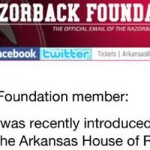
In the horrific event you find yourself watching political news, there are few things more aggravating than seeing politicians and pundits blabbering on with the same silly talking points and avoiding the true nuances of an issue.
And when the Arkansas legislature developed a bill for Arkansas to play Arkansas State a couple of weeks ago, besides reigniting the unholy alliance of sports and politics, it immediately brought out folks on both sides of the issue to spew the same tired half-truths they’ve been saying for years. It’s maddening. If you take a closer look at exactly what’s being said, it becomes exceedingly clear just how much of the whole ua vs asu debate is hot air.
“We don’t want to divide the state”
This is UA’s main line in response to the bill. It’s very choice wording used to give the impression that folks on the hill are the white knights looking out for the best interest of the state. They’re asking people, “Do you want our wonderfully united state to be split apart? Ripped at the seams like cheap non-Nike uniforms? It’s a hellscape we all know we cannot survive.”
What UA doesn’t want to divide is the near-monopoly they have on the state’s interest and recreational money spent on college sports – although the amount of division created by the two schools playing is highly debatable. Even if the Red Wolves defeated the Razorbacks, it’s unknown to what extent, if any, damage the Razorbacks would suffer long-term. Arkansas State beat Texas A&M back in 2008, and a few years later all the Aggies have done is joined the SEC, hired a new coach, beat Alabama, announced the expansion of their stadium, won a Heisman Trophy, may have the first pick in the NFL Draft, and became one of the hottest programs in the country. Hardly a death sentence.
It is understandable why UA wouldn’t even want to put that unknown on the table, but let’s not pretend that it’s for the good of the state that they don’t agree to a game.
“UA doesn’t have a good reason not to play ASU”
And they don’t need one.
This isn’t a court of law. Legal precedents don’t apply. The opinion in the case of School Bullies v. Dorks is all UA needs. If Jeff Long wanted to put up a billboard near the ASU campus with nothing but a picture of a Razorback giving the finger in ASU’s direction with the headline “Our Policy,” he could do that. This is why UA repeats the line about dividing the state and then drops the mic.
“ASU would never beat UA”
If the game had been scheduled last November, when Gus Malzahn had the Red Wolves rolling and the Razorbacks were mailing it in, do many people really think Arkansas State couldn’t have pulled off the victory? Or 2008 when the Red Wolves won in College Station and Arkansas barely squeaked by Western Illinois and Louisiana-Monroe? At the very least it would have been a good game.
“The game would increase interest and enthusiasm for football in Arkansas”
As if football isn’t popular enough. People would be interested in this game, but it’s hard to say it would have an impact on the game of football throughout Arkansas. And if Arkansas did blow out Arkansas State routinely, it could devolve into an LSU vs Tulane type of rivalry, in which there really isn’t much interest at all.
“Let’s keep the money in state”
The most ridiculous part of the bill to play this game is the complete avoidance of the financial aspects of the game. My theory is the only reason they added the part about donating the ticket revenue to charity is because they knew it would be difficult to come up with a real solution that would work for both parties. It’s a total cop-out.
I’m all for charity, but telling the schools, whose athletic departments rely heavily on the seven or eight home football games each year, that they’d have to give away revenues from one of those games is laughable. The schools could still write a substantial check to charity without completely committing all of their ticket revenue from the game.
So how to split the ticket revenue if the schools kept it? This is where the logistics of the game get complicated. The bill only calls for one game, but we all know that if the game happened once, there would be demand for it to happen again. Even if it takes place in War Memorial, the game only makes financial sense for UA if they keep all the ticket revenue, just as they currently do for their games in Little Rock. Let’s say the schools split the ticket money 50/50. At 26,000 tickets at UA’s current non-conference game in Little Rock ticket price of $55, that would come out to $1.43 million that they’d give away to ASU. That’s significantly more than what UA would save by not paying the usual non-conference game fee, which is rarely more than $1 million.
And even if the ticket money went to charity, that would mean the ASU game financially would be a road game for UA since they wouldn’t make money from it. Considering the possibility of a 9-game SEC schedule when the SEC Network kicks off (look ahead to Mike Slive’s announcement in April), Arkansas may then have six road games on its schedule, which Jeff Long has said he tries to avoid for obvious reasons (This also ignores the possibility of schools increasing their strength of schedule to accommodate the upcoming playoff selection criteria, but that’s another topic for another day).
Even from ASU’s perspective, it’d be interesting to see how they handled the scheduling of the game. For the last several years, they’ve scheduled at least two non-conference road games for which they’ve pocketed at least $1.5 million, topping out at $1.95 million from Oregon and Nebraska in 2012. The legislation didn’t call for UA to pay ASU anything to play the game, so would ASU be willing to forego a $1 million payday to play it? If all we’re doing is replacing the money ASU would get for a non-conference game and letting UA keep the money they’d pay for a non-conference game, that’s a wash in terms of keeping the money in state.
In fact, you can even argue it could cost the state money. If ASU gave up a $1 million game to play Arkansas, and the Razorbacks didn’t schedule, say, an $850,000 game (the Tulsa payout from 2012), that would be a net loss of $150,000 coming into the state instead of a net gain of $150,000. (The rate both schools pay/receive for non-conference games varies, but the math could easily work this way.)
ASU’s other option would be to replace one of their other non-conference games with Arkansas. The downside for this would be replacing a game scheduled for a decent chance of winning (Alcorn State, Memphis, UCA, Navy, Mississippi Valley State in recent years) with a game they’d lose more often than not (hurting opportunities for winning seasons and bowl bids), and it would take a game away from Jonesboro each year. Know what Jonesboro hotels and restaurants call this? The shaft.
Because at this point we reach a very basic economic principle: two games in the state generate more revenue than one.
When Arkansas and Arkansas State play separately, there are more tickets sold, more fans traveling, more hotels getting booked, more cars filling their gas tanks, more restaurant tables filled, more glasses poured, and so on. It doesn’t make the state any more money to give a Jonesboro game away in order to play Arkansas. It would in fact cost money.
So if it doesn’t make sense financially to play Arkansas, why does ASU really want to do it? Because of people like me.
Not me at this point in my life, but me in high school.
I was born and raised in Little Rock. Most all of my family either lives in Central or Northwest Arkansas. I had no connection to Northeast Arkansas nor Arkansas State at all other than a few high school friends who attended the school. When I was thinking about various colleges as high school came to an end, I never thought of ASU as being on the same level as UA, not just athletically, but as a whole.
As kids, athletics is often the first introduction we have to colleges. When I was growing up, no matter what kind of season the Razorbacks were having in any sport, UA was the only school that mattered to anybody I knew. Since the Razorbacks played so many of the top schools in the country, and never played ASU or any other in-state school, it made UA feel like it was on a completely different level.
I don’t know how much seeing UA and ASU on the same field or court would change that, but maybe it would a little bit. We know some people believe that sort of appearance may be worth losing money for. In 2011, UCA turned down $300,000 from Houston to take $150,000 to play at Arkansas State. Of course, the Bears were blown out, so whether they gained anything from the one-time game to make up for losing out on $150,000 is certainly up for debate.
In the end, as a guy writing about sports, I’m in favor of the best story, and normally this game would be a better story than UA playing other Sun Belt teams. However, I think it makes sense for Razorback fans and UA to avoid the game just as much as it makes sense for ASU to want it. The best way for it to happen is for UA to have a real reason to play it, and that’s what’s missing right now.
Doc Harper is the managing editor of Arkansas Expats and is a regular contributor to College Football News and Sporting Life Arkansas. You can email him here and follow him on Twitter.












